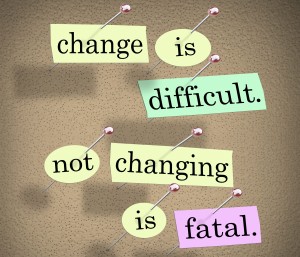Your #Career : #ChangingCareers ? Here’s Exactly What To Put On Your #Resume . And What to Leave Off…
It’s not that hard to update your resume when you’re applying for the next role up the ladder in your field. You’re an associate operations manager trying to become a senior operations manager? Just show how what you’ve already done qualifies you to do similar things at a higher level.
Things get trickier when you’re trying to change industries. You’ve got to rebrand experiences here as transferable qualifications there. You need to explain why you’re a better hire than the candidate who’s spent their whole career in the field you’re trying to get into. And you’ve got to decide which parts of your experience just aren’t relevant anymore.
Figuring this out is a highly situational challenge–what works for one career changer’s resume might not work for another’s. But Erica Breuer, founder of Cake Resumes, says there are some straightforward dos and don’ts that can point you in the right direction.
DO: INCLUDE GROUP WORK
“I often work with career changers who don’t feel they have the right to include projects on their resume that were a team effort, especially when these projects fell outside of their normal job duties,” Breuer tells Fast Company. But it’s precisely those experiences you’ll want to rely on the most. “Including them, while nodding to the team-based or ‘special projects’ nature of the work is the way to go,” she says. “If it happened, it’s a fact, and it can go on your resume.”
Think of it this way: The tasks that are small, routine, or specialized enough for you to complete on your own may not be that relevant outside your industry. But bigger, collaborative projects tend to involve processes and challenges of a higher order, which draw on skills that just about every employer needs–no matter their field.
Like this Article ? Share It ! You now can easily enjoy/follow/share Today our Award Winning Articles/Blogs with Now Over 2.5 Million Growing Participates Worldwide in our various Social Media formats below:
FSC LinkedIn Network: www.linkedin.com/in/fscnetwork
Facebook: http://www.facebook.com/pages/First-Sun-Consulting-LLC-Outplacement-Services/213542315355343?sk=wall
Google+: https://plus.google.com/115673713231115398101/posts?hl=en
Twitter: Follow us @ firstsunllc
Question: Want the ‘the best/current articles/blogs on the web’ on Job Search, Resume, Advancing/Changing your Career, or simply Managing People?
Answer: Simply go to our FSC Career Blog below & type(#career, #leadership, #life) in Blog Search: https://www.firstsun.com/fsc-career-blog/
What Skill Sets do You have to be ‘Sharpened’ ?
Continue of article:
DON’T: FUDGE JOB TITLES
“Many career changers get the advice to tweak job titles on their resume to look like the perfect fit. This almost always backfires,” Breuer explains. “It risks looking dishonest or, worse, the self-assigned titles they create add confusion more than they align them with a new path.”
While you can’t control your past job titles, you can control how you describe what you accomplish while you held them. Breuer’s suggestion? “Add a tagline of sorts to the true job title, one that states experience related to the new career direction, for example; ‘Director of Operations—Global Recruitment & Talent Acquisition.’” This way a hiring manager in the HR field, which you’re trying to get into, can spot right away that your operations role had to do with recruiting and talent.
(SOMETIMES) DO: DITCH STRICT CHRONOLOGY IF YOU NEED TO
For job seekers with a lot of experience, it’s common to truncate anything that came before the past 15–20-year period. But Breuer says this rule doesn’t always suit, especially “when you have an early-career experience that applies to an upcoming career change. Drawing this line is important, but so is sharing the details relevant at this very moment. If you’re not doing that, the resume is pointless,” she points out.
So feel free to shake up the chronological approach if you need to. “There are a number of ways to loop early experiences back into a resume without the kitchen sink-style timeline,” says Breuer. For example, you might try breaking your work history into subcategories like “Technical Experience” and “Managerial Experience.”
DON’T: GO TOO BROAD
A final common mistake Breuer sees pretty often among job seekers hoping to change careers is “expecting their resume to do too many things at once,” she says. “They want to capture their career wins, life story, hobbies, and persona as a whole, when a resume actually functions best when it’s a compelling and concise record of your experiences as they pertain to the role at hand.”
When you’re worried about being under-qualified, you might be tempted to overstuff your resume to compensate. Don’t do that. The key is to give recruiters and hiring managers a clear narrative about why you’re the best fit from the role because you’d be coming at it from a nontraditional angle. No, that won’t be the full story of your career, but it will probably be the most effective one for this opportunity.
To take some of the pressure off, Breuer suggests remembering that your resume–while important–is only one piece of the self-portrait you’re presenting to employers. She adds, “It should stack with other branding platforms, such as a personal website, LinkedIn profile, or even a cover letter, in order to tell the whole story of who you are and the value you bring.”
FastCompany.com | May 14, 2018 | Rich Bellis









